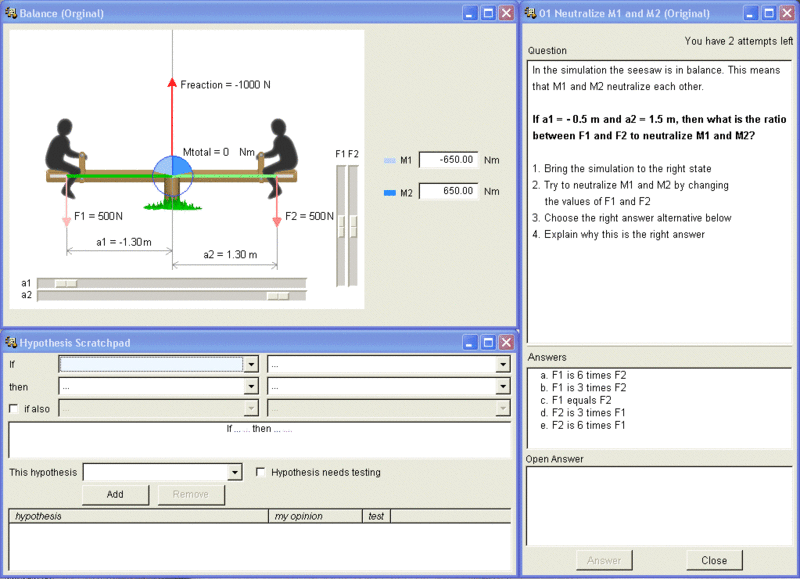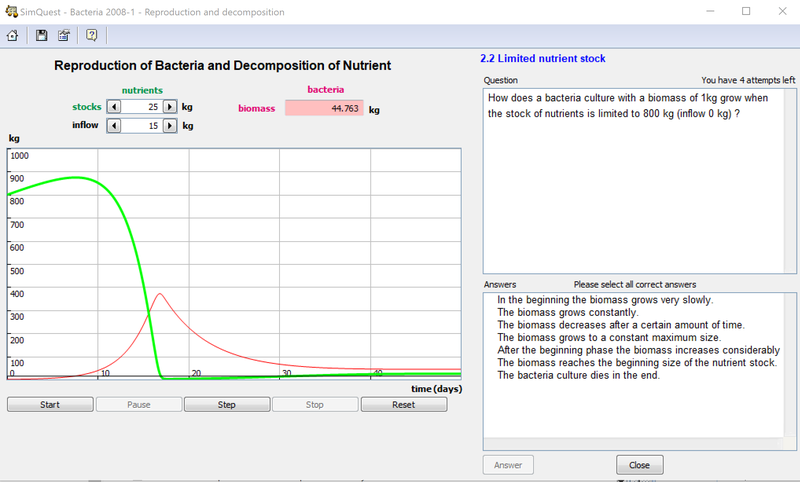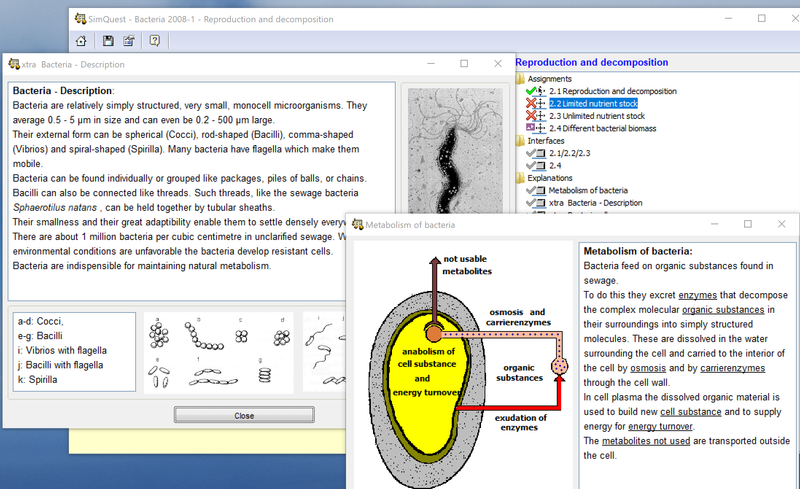SimQuest
Definition
SimQuest is a free authoring system developed by University of Twente for designing and creating simulation-based learning environments. It is particularly suitable for designing dynamic and interactive guided discovery learning environments.
See also: science simulation microworlds, inquiry learning, guided discovery learning, concept learning, computer simulation
Note: There is also a commercial SimQuest system for BioMedical Simulation. Not the same thing !!
Authoring with SimQuest
This is provisional cut/past from the SimQuest web pages ....
Authoring in SimQuest basically consists of selecting elements from a library (left window) and dragging them to an application (right window).
The SimQuest library consists of elements that can be part of a SimQuest learning environment (simulations models, assignments, explanations etc.). There are composite elements (that may contain other elements themselves, such as for example 'new interface'), and specific elements. Authors can explore the library by opening and closing folders.
Simquest applications
An application in SimQuest exists of a mathematical model that is used to calculate the values of the simulation. Secondly it exists of an interface, that is used to make it possible for the learners to interact with the model. And third, support in the form of feedback can be added to help learners in exploring the domain.
The learner interface allows to interact with the model, i.e. to change values by moving a slider, clicking a radio button, setting a dial, etc.
The interface then shows how the model behaves. The model behaviour can be visualized by using graphs, dials thermometers, etc. This interface is taken from the Motion application.
Finally, the system allows to define assignments (i.e. exercises which support learners in exploring the domain) and explanations that provide learners with information to explain or illustrate something, or to give appropriate feedback.
Examples
SimQuest comes with a few built-in examples. Additional one (about 4 English and the rest in Dutch) can be downloaded from the the website.
To run these examples, double click from the file manager.
The Balance example
Many SimQuest models have been built and most are available for download. E.g “Balance” is a SimQuest simulation on the physics topic of moments. Students can change the two forces acting on the persons (F) and the distances to the center of the seesaw (a) and discover the effect on the moment (M). Support is offered in the form of an assignment that asks students to explore the balance of the seesaw. Another available cognitive tool is a hypothesis scratchpad that lets students build expressions from variables (e.g., force F1, distance a1, and moment M1) and relations (e.g., increases) to create testable hypotheses (e.g., if F1 increases, then M1 increases). (Balance, retrieved 17:34, 30 June 2007 (MEST))
Bacteria example
The Bacteria 2008 simulation demonstrates exponential growth of bacteria in various conditions. The simulations are divided in two chapters, reproduction of bacteria and reproduction and decomposition. For each, the software includes a series of assignments and a deck of explanations that can be used freely.
Explanations must be displayed before launching the assignment screen.
Links
SimQuest Home Page. Includes download links for this free software, simulations, help, research papers, etc. (registration required).
References
- de Jong, Ton (2006) Computer Simulations: Technological Advances in Inquiry Learning, Science 28 April 2006 312: 532-533 DOI: 10.1126/science.1127750
- Van Joolingen, W.R.; King, S. and Jong de, T. (1997) The SimQuest authoring system for simulation-based discovery learning. In: B. du Boulay & R. Mizoguchi (Eds.), Artificial intelligence and education: Knowledge and media in learning systems. IOS Press, Amsterdam, pp. 79-86. PDF
- Van Joolingen, W. R., & De Jong, T. (2003). Simquest: Authoring educational simulations. In T. Murray, S. Blessing & S. Ainsworth (Eds.), Authoring tools for advanced technology educational software: Toward cost-effective production of adaptive, interactive, and intelligent educational software (pp. 1-31). Dordrecht: Kluwer Academic Publishers.


